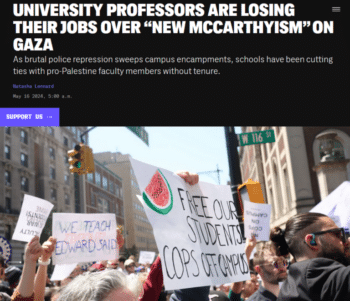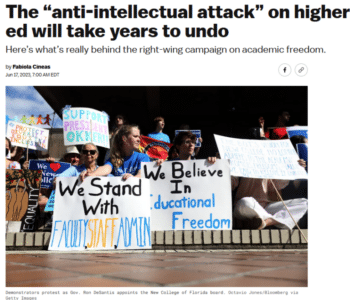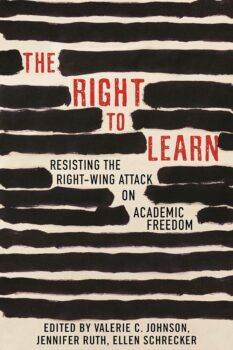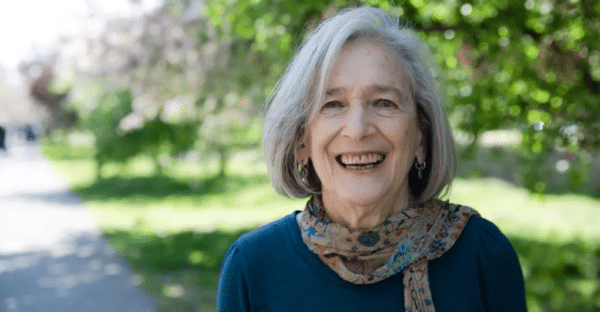Janine Jackson interviewed historian Ellen Schrecker about the attack on academic freedom for the May 24, 2024, episode of CounterSpin. This is a lightly edited transcript.

Intercept (5/16/24)
Janine Jackson: Any accounting of the impact of Israel’s Gaza assault on scholarship, on learning, has to start with the reduction to rubble of all 12 universities in Gaza, with the incalculable loss that entails, and the reported killing of at least 90 professors. But as the Intercept’s Natasha Lennard writes:
Israel’s attempted eradication of intellectual life in Gaza echoes far beyond the territory, with U.S. universities ensuring that some professors vocal in their support of Palestine can no longer do their jobs either.
We are now learning of how many academics and teachers around the country are seeing their jobs targeted as part of a purge, aggressively encouraged by funders and—mostly, but not only—Republican politicians.
It’s being called a new McCarthyism. But our guest, an expert on McCarthyism, suggests we understand other elements at play that make today different from, say, anti-Vietnam college protests in the 1960s, including the fact that today’s political repression aims not just at teachers themselves, but at what gets studied and taught.
Historian Ellen Schrecker is author of numerous books, including The Lost Promise: American Universities in the 1960s; No Ivory Tower: McCarthyism and the Universities; and she’s editor, with Valerie C. Johnson and Jennifer Ruth, of the new book The Right to Learn: Resisting the Ring-Wing Attack on Academic Freedom, out now from Beacon Press. She joins us now by phone. Welcome back to CounterSpin, Ellen Schrecker.
Ellen Schrecker: Thank you for having me on your program.
JJ: There are a number of differences between student (in particular) protests today, and that of the 1960s. For one thing, today’s student protesters remember previous student protesters, and their impact on history. And I would say, also, the availability today of more person-to-person information sources, avenues outside of “all the news that’s fit to print.” But you note that the playing field of the university, as a site, as a place for voicing dissent, is itself importantly different. Tell us about that.
ES: Yes, that’s really the key issue now. Every time there is an attempt to repress free speech and academic freedom, I’m always asked, how does this compare to McCarthyism? And I’m a trained historian, so I sort of put in a lot of nuance, and I’ll say, “Oh, it depends….” But I don’t do that anymore, because it’s worse than McCarthyism. Much worse.
And that is really because the university of 2024 is a very different place than the academic community in the late 1960s. In the 1960s, American universities were expanding. They had a great reputation. People loved them. State governments and the federal government were throwing money at the universities.
And that’s no longer the case. And what we’re seeing is a very much weaker system of American higher education than had existed during what was called the Golden Age of American higher education, in the late 1950s and 1960s.
So I’d like to talk about what has changed between that period and now, and why what’s happening today is so much worse.
When we look at McCarthyism itself—and up until recently, it was probably the longest-lasting and most widespread episode of political repression in the modern American university—what we saw was an attack on individual faculty members. It was part of a broader purge of left-wing scholars, movie stars, government officials. It was running throughout large sectors of American society, not specifically targeting the universities, but they probably accounted for a quarter or fifth, maybe, of the victims of McCarthyism, in the sense that these were the people who were losing their jobs as a result of the inquisition.
To my knowledge, there were about a hundred people, more or less—probably more, because people kept this stuff secret, so they could keep their jobs—who were fired. And they were fired specifically because they had had some kind of connection with the American Communist movement earlier in the 1930s and ’40s, and did not want to cooperate with the ongoing anti-Communist inquisition that we now call McCarthyism. (Although we should have called it Hooverism, if we really understood how it operated.)
But anyhow, what’s interesting, and what’s very different, of course, from today, is that these people were being fired for their external political activities, or former political activities, and were never questioned about their teaching or scholarship. That was simply not of interest. It was their political work, or former political work.

Vox (6/17/23)
That’s not the case today. What is happening today is that there is a huge movement attacking all of American higher education. It’s been ongoing now for 40 years. It started as a response to the ’60s, to the student movement of the ’60s, to the originally nonviolent civil disobedience. These students were protesting, very much like students today, against what they saw as a dreadful moral calamity, a dreadful American participation in the Vietnam War. Certainly that was the main thing, but also, they were very involved with the movement for racial justice.
And as they tried to get some kind of action to end the war—which they actually did do, but it wasn’t obvious at the time—and trying to open up American society to racial equality, they became frustrated and noticed that their own institutions, universities, had been collaborating in some way with these injustices that they were seeking to rectify.
And so that’s why you get this sort of campus-focused movement on the part of students, because, after all, this was the only institution they could affect. They may not have been particularly realistic; in retrospect, maybe they should have emphasized electoral politics a lot more than they did, but that’s rewriting history. What we need to learn from history is the fact that as a result of the student unrest of the ’60s—which was essentially nonviolent on the part of the students, and only became particularly violent when universities and political bodies sought to repress it, just like today, of course—what we’re seeing on campuses is police violence; the kids have been remarkably restrained, much more so than in the ’60s, actually. They’re just sitting on the ground in their tents.
They’re not bothering anybody, except, of course: if you look at this from the perspective of 40 years of repression against higher education, that is in large part, not entirely by any means, but in large part the product of a very self-conscious conspiracy, and I don’t use the word “conspiracy” a lot, on the part of a group of very wealthy businessmen and intellectuals who were seeking, as early as the 1960s, to roll back the political reforms of the ’60s, and impose a more right-wing, neoliberal political culture on the United States, that contained, as one of its main focuses, an attack on higher education.
Because these wealthy conservatives felt that the kind of dispassionate and educated, evidence-based scholarship that was coming out of universities was attacking them, and they wanted to destroy the reputation of higher education. And they did so very self-consciously, by undermining the institutions of higher learning, by circulating propaganda about how universities have been taken over by left-wing professors, by—the word that they use today is “woke”—the forces of “woke” left-wing radicals, by weak-kneed administrators who are capitulating to these powerful forces.
Well, that wasn’t the case at all. What happened was universities themselves changed in response, not just to this attack, but also in response to a very strong economic pullback on the part of the state legislatures and the federal government that had been funding them so well up until the end of the ’60s.
So what we’re seeing is universities that then, for the past 40 years, have been responding to a very different financial economic situation, an economic climate that was punishing them, and they had to respond, administrators did, not by taking a more positive approach to what’s going on, and trying to sell what American higher education was doing for the country, for individuals, they thought to placate these forces of reaction.

Ellen Schrecker: “Universities have also ignored their faculty members, and this is why they have put up, I think, such a pathetically weak and collaborationist response to the current repression.”
But they also responded by seeking other sources of income, when state funding shrank, and that’s key. And what did they do? They raised tuition, slowly at first, but then quite significantly. So we now have, of course, the student debt problem, which I think it’s up to $1.8 trillion of student debt. And we have people being very upset about how much higher education costs, when in so many other countries, it seems to be free.
They also look for other sources of income: donors. The leaders of higher education began to curry favor with these very wealthy billionaires, many of whom were funding this attack on higher education. So we’re seeing that, and we’re also seeing universities themselves following a corporate agenda, on the assumption that this is what they can do to get favor with the new donors.
But also because they have imbibed the neoliberalism that came about beginning in the 1970s, and continuing through til today, whereby the public good sort of disappears from the agenda and it’s intensely individualistic. Even a higher education now is something that’s good for individual people, and its role as a benefit to the rest of society has long since disappeared, which is really a total travesty.
Anyhow, as a result, universities have also ignored their faculty members, and this is why they have put up, I think, such a pathetically weak and collaborationist response to the current repression.
The final point here is that the way that the universities have been weakened is by ignoring their faculty members, but also by destroying the faculty: Over the past 40 years or so, very gradually, the number of full-time tenured and tenure-track faculty members has declined to the extent that 75% of all instruction is now being offered by faculty members who have no academic freedom.
These are what we call contingent workers. They are part-time or contract temporary workers who have no academic freedom, no economic security. They can be fired at any time for any purpose or no purpose at all. And they are not in a position to fight back, and their administrations do not support them when they’re attacked from the outside.
They’re very good teachers. They’re equally qualified with the tenured and tenure-track faculty members, but have terrible salaries. They often are hired to teach one course for one semester for $3,000 or so, that’s the average pay, and can be fired at any time.
And I think we have to realize that this is a structural problem that needs to be addressed before we can really fight back and preserve the jobs of people who are now particularly threatened, especially after October 7, by another group, a very powerful political group of supporters of Israel.
JJ: The fact that, of the many professors who’ve been fired, only one of them, as far as we know right now, had tenure—it is the adjuncts, it is the people who are basically at-will workers who are easier to just be cut off by these universities. So part of it is, it is this structural thing where you undermine the very idea that as a professor you would have some kind of job security, you would have some kind of protection.
ES: Exactly. Yes.
JJ: Let me just say, we have seen a number of professors putting themselves, sometimes physically, between students and police. We have seen professors standing up for, not only their own rights to speak, but their students’ rights to protest. And I would just say, because we’ve talked about this before, that faculty/student support and coalition-building, that’s part of a tradition too.
ES: Exactly. And what we’re seeing, for the first time, really, since the 1960s, is faculties beginning to organize themselves in support of causes that many of us support. And that should be protected by the universities and has not been, because the administrations over the past 40 years have been seeking to curry favor with these right-wing billionaire donors, and have been living in a kind of right-wing bubble.
They don’t know students, they don’t care about students. What they care about is getting money, getting support, growing their institutions, growing them in a way that will appear on the US News & World Report status ranking, without really paying attention to the kind of education they’re giving their students.
And it’s been shown, there’s evidence that the predominance of these temporary and low-paid contingent workers are unable to give their students the kind of education they deserve. And that’s a very significant problem. But, together, what we’re seeing is a real beginning, however, of a new awareness that we’re all in this together.
I would argue that the most powerful way to fight against this probably is through unionization, through organizing unions that can get contracts that include language supporting academic freedom. That’s very important. That seems to be the only way that these gig, part-time and temporary professors can gain a measure of economic security, so that they can speak out and keep their jobs.
I mean, this is really destroying free speech within American society, because universities have traditionally been, and certainly at the moment still are, spaces where there is more support for intellectual freedom than anywhere else in American society.

Beacon Press, 2024
So it’s very important that faculty members begin to fight back, begin to form coalitions, can begin to argue for a serious pushback against these forces that, as we know, have been passing laws, certainly since 2020, in red states and in some blue, to sanction free speech and ideas that the right-wing Republicans do not think are appropriate. And this is a terrible threat to our whole democratic system.
JJ: The book talks about how we can’t just rhetorically defend academic freedom and free speech; we have to act, and the book is part of that. So I would just ask you, finally, this new book, The Right to Learn, I want to say, it’s not a tome; it’s immensely readable. I just would ask you, what do you and other contributors hope that this book will do in the world? How do you look for it to be used?
ES: OK, we wrote this book more than two years ago, and I remember feeling it recently: “Oh my God, it’s out of date. How can it be used?” Well, it’s more relevant now than it was then. The situation has really worsened enormously since October 7.
What we were hoping to do is give people some intellectual ammunition, the facts about what’s going on on American campuses, and how people have been distorting history, have been distorting constitutional measures, have been distorting the function of academic freedom, and how people can fight back, give people information that they need, so that then they can go out and become active on their campuses, recruit colleagues, recruit students, start teach-ins, start doing whatever they can to create a buzz on their campuses, which certainly is happening.
But we’ve got to mobilize. We’ve got to organize. People have to have the information, and that’s what we felt was a necessary precursor for mounting a serious campaign to take back power on our campuses, to bring the faculty back into action as it has never been before. And we’re really asking for something very revolutionary, I guess.
What we’d like to see is a much more democratic university, that isn’t under the sway of these reactionary politicians and businessmen. And it’s going to be hard to do. It’s going to require a lot of action, but we want that action to be well-informed, and we hope that this book will be useful, be a weapon. It’s not going to save the world, obviously, but it’s our contribution to this campaign.
JJ: Thank you so much for that. We’ve been speaking with Ellen Schrecker, author of books, including The Lost Soul of Higher Education: Corporatization, the Assault on Academic Freedom and the End of the American University. That’s available from the New Press. The new book we’re talking about is called The Right to Learn: Resisting the Ring-Wing Attack on Academic Freedom That’s out now from Beacon Press. Thank you so much, Ellen Schrecker, for joining us this week on CounterSpin.
ES: Thank you so much, Janine, for having me.

